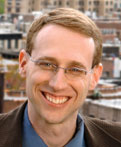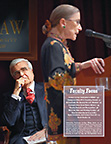Assistant Professor of Law
 Originally published in the 2005 issue of the Law School magazine.
Originally published in the 2005 issue of the Law School magazine.
In the four years that Oren Bar-Gill has been in the U.S., he has published 11 papers, has five more on the way and has presented at the prestigious American Law and Economics Association conference. The Israeli, who joined the New York University School of Law last January, is the envy of his colleagues. “He’s uniquely brilliant. His I.Q. is in the sky,” says Omri Ben-Shahar, Bar-Gill’s former professor who will visit the Law School from the University of Michigan in the fall. Bar-Gill, however, keeps such effusive praise in perspective.
“I do believe that my work is important,” says Bar-Gill, 30. “Still, when I look at friends who are neuroscientists, or people who study epidemics, this is a humbling experience for me.”
A self-professed nerd who placed third in a regional geometry competition in ninth grade, Bar-Gill combines his love for numbers with his interest in justice to carve out his specialty, law and economics. “He comes up with ideas that nobody has thought of before,” Ben-Shahar says. “Every paper he writes has a surprising, counterintuitive idea.” For example, in “The Value of Giving Away Secrets” (written with Gideon Parchomovsky), Bar-Gill argues that, contrary to accepted wisdom, inventors prefer narrow protection and disclosure over broad intellectual-property protection. In other papers he argues against nullifying contracts that impose seemingly heinous credit terms on the low-income consumer. “If I’m selling furniture in an inner-city community and I’m not allowed to insert these credit terms into the contract, I might simply decide not to sell there at all.”
In his 2004 paper “Seduction by Plastic,” Bar-Gill explored the policy debate over legal intervention in the credit card market. He’s currently expanding that research into a book, Market Failure and Behavioral Economics, to be published by Harvard University Press in 2007, about the interplay between consumer psychology and market forces in consumer markets, such as those for cell phones, magazines and health clubs. “He does in several hours things it takes many professors half a year to finish. He’s the most efficient person on earth,” says Michal Barzuza of the University of Virginia School of Law.
Bar-Gill has always been a quick study. Raised with his equally brilliant siblings (his brother is a physicist, his sister a mathematician and dancer) in the suburbs of Haifa by his father, Aharon, 59, a professor of aerospace engineering, and mother, Nechama, 56, a schoolteacher, Bar-Gill skipped a grade in grammar school. “I have no idea why. I guess I was bored.” Playing basketball and tennis spared him from being branded a complete geek, however.
After Bar-Gill graduated high school in Haifa in 1992, with a major in computers and electronics, he was accepted into the Academic Reserves Program, which allows students to defer their mandatory army service until after they’ve finished their studies. He was set to enter the Technion in Haifa, where he would be groomed for an engineering post in the Israel Defense Force (IDF), but switched gears: “I had this great aspiration to become a judge, a naive desire to make a difference.”
Early in law school at Tel Aviv University, however, he reassessed. “I realized that most of what judges do is fact-finding rather than analytical legal reasoning. While this is very important, it was not the intellectual exercise I wanted,” he says. He pursued a joint degree in law and economics, earning a J.D. equivalent, magna cum laude, from Tel Aviv University in 1996 and a Ph.D. in economics in 2002. In the meantime, he enlisted in the legal department of the IDF in 1997, where he worked under the chief military prosecutor doing appellate litigation. “I saw a lot of action on paper,” he jokes. Thinking outside the box once again, he says: “A lot of criminal litigators see prosecutorial power as a bad thing. The lesson I learned is that if you really want to help defendants, you should become a prosecutor, because you have the power to make sure defendants get a fair trial. You can decide how to frame the charges and which sentences to request.”
Bar-Gill met his wife, Sigal, 29, a shiatsu therapist, during the summer just after he finished high school. They married in 1997 and in 2000, moved to Boston, where Bar-Gill obtained an S.J.D. at Harvard in 2005. He and Sigal currently live in New York with their two-year-old daughter, Noam. “Often someone who is busy promoting his career has to forge ahead at the expense of other people,” Ben-Shahar says. “But Oren is very much a family person and a great friend. He’s truly a mensch.”
—
